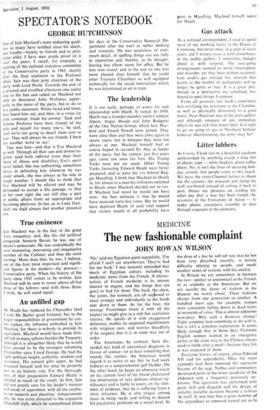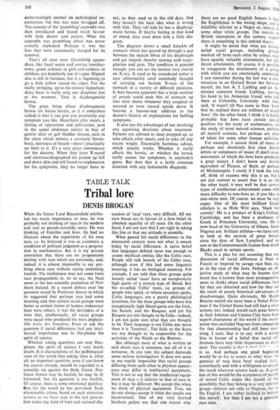MEDICINE
The new fashionable complaint
JOHN ROWAN WILSON
No,' said my Egyptian guest regretfully, 'I'm afraid I can't eat strawberries. They're bad for my back.' I was instantly reminded that much of Egyptian culture, including its medicine, stems from the French. A charac- teristic of French medicine is its intense interest in organs, and the things that are good or bad for them. The back, tlie chest, the joints, the stomach, are all supposed to react strongly and individually to the foods sent down to them. As for the liver, the average Frenchman treats it with all the respect he might give to a rich but capricious relative. He speaks of it with exaggerated deference, studies its supposed requirements with religious care, and worries dreadfully if he suspects that it is in some way out of order.
The Americans, by contrast, have dis- carded this kind of anatomical diagnosis in favour of science—or at least something that sounds like science. An American would regard it as naive to say that he had weak kidneys or a temperamental gall bladder. On the other hand, he keeps an obsessive watch on the current level of his blood cholesterol an observation of very dubious clinical sig- nificance) and is liable to assert, on the slim- mest of evidence, that he is suffering from a virus infection. He is also unique among races in being ready and willing to discuss his psychiatric problems on a social level. At the drop of a hat he will tell you that he has been very disturbed recently, is having difficulty relating to people, and needs another series of sessions with his analyst.
In Britain we are somewhere in between the two—neither so anatomical as the French or as scientific as the Americans. But we are equally the slaves of fashion in the diseases we worry about. These fashions change from one generation to another. A hundred years ago, for example, women were constantly falling down in dead faints at moments of crisis. This is almost unknown nowadays. Why such a dramatic change? Tight corseting had something to do with it, but it isn't a complete explanation. It seems likely enough that in those days Victorian English women fainted in an emergency rather in the same way as the Chinese always used to belch after a meal—because they felt it was expected of them.
Everyone knows, of course, about Edward VII and his appendicitis. Once the royal appendix had been removed the operation became all the rage. Nobles and commoners developed pains in the lower quadrant of the abdomen- with a frequency previously un- known. The operation was performed with great skill and dispatch and the design of suitably invisible incisions became a fashion in itself. it was true that a great number of the appendices so removed turned out to be embarrassingly normal on pathological ex- amination, but this was soon shrugged off. The concept of the 'grumbling' appendix was then introduced and found much favour with both doctor and patient. What the appendix was grumbling about was never actually explained. Perhaps it was the fees that were customarily charged for its removal.
That's all over now. Grumbling appen- dices, like focal sepsis and routine tonsillec- tomy, green sickness in girls and acidosis in children, are hopelessly out of vogue. Slipped disc is still in business, but it is beginning to go a little yellow round the edges. For the really swinging, up-to-the-minute hypochon- driac there is really only one diagnosis just at the moment. That is diaphragmatic hernia.
The great thing about diaphragmatic hernia (or hiatus hernia, as it is sometimes called) is that it can give you practically any symptom you like. Heartburn after meals, a feeling of oppression and suffocation, pain in the upper abdomen similar to that of gastric ulcer or gall bladder disease, pain in the chest which mimics a coronary throm- bosis, shortness of breath—there's practically no limit to it. It's a very great convenience for the doctors. When they have X-rayed and electrocardiographed the patient up hill and down dale and still found no explanation for his symptoms, they no longer have to say, as they used to in the old days, that they haven't the least idea what is wrong with him. They tell him he has a diaphrag- matic hernia. If they're feeling in that kind of mood, they even draw him a little dia- gram.
The diagram shows a small knuckle of stomach which has passed up through a gap between the muscle fibres of his diaphragm and got nipped, thereby causing acid regur- gitation and pain. The condition is genuine enough; you can see the hernias very clearly on X-ray. It used to be considered rather a rare abnormality until somebody thought of carrying out barium X-rays of the stomach in a variety of different positions. It then became apparent that a large number of people could push bits of stomach up into their chests whenever they coughed or sneezed or were turned upside down. It became a heaven-sent addition to the doctor's battery of explanations for baffling symptoms.
It also has the advantages of not involving any agonising decisions about treatment. Patients are advised to sleep propped up, to take alkalis after meals, and to take off any excess weight. Essentially harmless advice, which usually works. Whether it really affects the hernia, or whether the hernia really causes the symptoms, is anybody's guess. But then that is a fairly common situation with any fashionable diagnosis:































 Previous page
Previous page